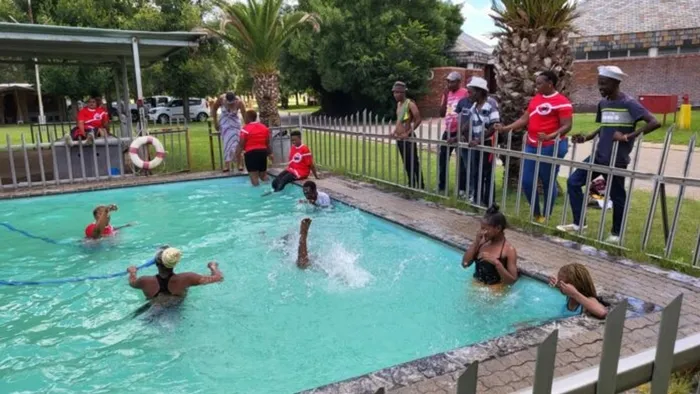‘Rhapsody of reconciliation’ in SA is an empty echo

Picture: Supplied – Community members swim in a pool located in the Maselspoort Resort and Conference Centre in the Free State where black teenagers were assaulted by white men for swimming in a pool ‘reserved for white people only’ on Christmas day last year. If South Africans cared about reconciliation, racist outbursts would have ceased long ago, says the writer.
By Kim Heller
White South Africans have never really cared for reconciliation or social cohesion.
If we did care, we would have asked for forgiveness and offered reparations for apartheid atrocities. We would have acknowledged that both our unearned privilege and the underserved black poverty of today are the handiwork of the white supremacy of yesteryear.
If we cared about reconciliation and social cohesion, we would have stopped our serial racist outbursts long ago, bothered to learn African languages, and ended our drone about leaving the past in the past while remaining mute on historical ills.
Social cohesion is a pretty tune. Mandela sang lyrically about it, as have other ANC presidents. The charmed composition of social cohesion is a popular song, yet for all its melodic notes, it is partly out of tune with real-day South Africa. For the world’s most unequal country, with its untreated historical inflexions of grave racial inequality and in-set structural patterns of white privilege and black poverty, social cohesion is an empty echo.
Nelson Mandela’s inaugural speech in 1994 was a rhapsody of reconciliation, a harmonica of hope for recovery and renewal after the long seasons of the deep ruin of black lives under apartheid and colonial rule. Mandela said on the eve of democracy: “Each time one of us touches the soil of this land, we feel a sense of personal renewal. The national mood changes as the seasons change. We are moved by a sense of joy and exhilaration when the grass turns green, and the flowers bloom.”
Mandela was hoping to herald in a new-found national identity and a countrywide accord and renewal. But there has been no rekindling of a new social compact between black and white South Africans or a revitalised consciousness for the country. Rather, there has been a renewal of white economic and socio-cultural power and black economic and socio-cultural powerlessness. And all under a national anthem of social cohesion, which at times appears to be deaf to the masses.
As the ANC celebrates its 111th anniversary, for millions of black South Africans who remain landless and jobless, there is little of the joy or exhilaration that Mandela spoke of in his inaugural speech. For a governing party so enchanted by the saccharine sweet stanzas of social harmony and the jolly poetry of social reconciliation, land, and economic justice is too harsh a verse.
Grand-scale historical injustice against black South Africans and white culpability for crimes against humanity was cast aside as if they were the unwanted and illegitimate offspring of a past relationship that one wants to forget and forsake. Inconvenient truths were traded for convenient lies to forge, or more aptly, force a new relationship between white and black, oppressor and oppressed. The new government, more concerned with white comfort than black discomfort, effectively gave white South Africans a free pass into a democratic order and carried the baggage of ill-gotten power and privilege into the ‘new South Africa’.
Reconciliation has been a one-sided affair. In truth, reconciliation is an unholy alliance between an unrepentant oppressor and an ever-forgiving and over-obliging oppressed group. It is a relationship that can never last. The Rainbow Nation, with all its soft picturesque colourful rays, cannot blot out the blood red of South Africa’s past. Social cohesion without social justice is illegitimate. “We succeeded to take our last steps to freedom in conditions of relative peace. We commit ourselves to the construction of a complete, just, and lasting peace,” Mandela rang out.
But there has been no social justice, and we don’t deserve true and lasting peace. Serial racism will continue. Outrage will follow. It is now a pattern of our democracy. Commenting on the recent assault on black teenagers by white men at the Maselspoort resort, Bishop Malusi Mpumlwana of the SACC said: “The grotesque images of adult white men throwing their all at black teenagers, with a man throttling a boy, and two others appearing to attempt to drown another boy, are sickening and must be condemned by all South Africans, with a crescendo, especially from white people and white organisations of influence,” a just, equitable and harmonious nation.
There is too little outrage about the everyday grotesqueness of structural racism, the excruciating violence of black exclusion and poverty, of dreams lost in the dire of the everyday. Black South Africans should expect nothing from white South Africans. Repeatedly, whites have shown more interest in safeguarding their privilege than in investing in a just, equitable and harmonious nation.
If the ANC is genuinely concerned about justice and liberation for black South Africans, it is time to change its tune. From a lullaby of social harmony to a resounding, more radical beat of true social transformation. The ANC must shift its focus to dealing with the systemic sickness of racism and inequality, and on refocusing the consciousness of people, culture, and economy on a real beat of social justice.
If it fails to do so, the dignity of a black child will, as it was under apartheid and colonialism, continue to be a sorrowful, unheard cry.
Kim Heller is a political analyst and author of ‘No White Lies: Black Politics and White Power in South Africa’